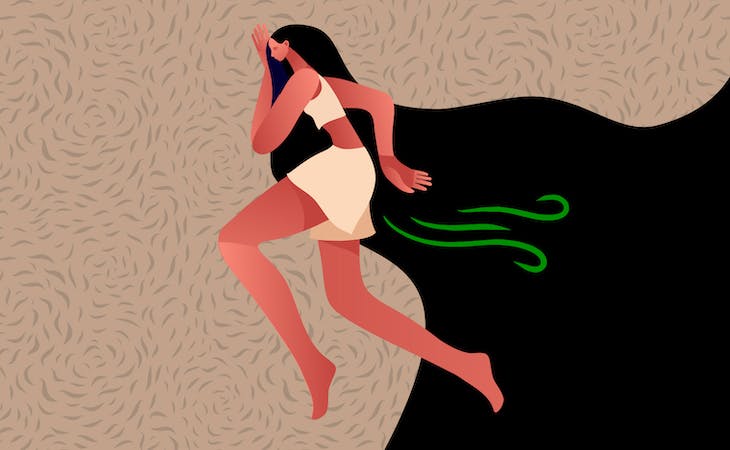Everyone farts. Although it’s usually harmless, farting can be embarrassing in certain circumstances. And most of us don’t want to be known as the proverbial fart in church whose behavior is out of line in, say, a solemn occasion.
Whether you call it farting, flatulence, or passing gas, this natural bodily function happens—as many as 13 to 21 times a day—as a result of your digestive system breaking down the food you eat. Most of the time, it’s even normal to fart in your sleep.
This article will explain why farting during sleep happens and offer tips to help you avoid farting in your sleep.
Can you fart in your sleep?
Yes, it turns out you can fart in your sleep. As to why this happens, the reason lies in the anal sphincter. The circular muscle that keeps the contents of your large intestine inside actually fluctuates in relaxing multiple times an hour.
As one study described it in the American Journal of Physiology, “the anal sphincter is a dynamic structure not often at rest.” So even though you may be asleep, your sphincter never sleeps.
During sleep, your anal sphincter is more relaxed. Unless you have diabetes or another medical condition, it isn’t so relaxed that feces slip out during sleep. But it can definitely allow the release of gas.
Although your body manages to turn off most of its other autonomic functions during sleep, it’s not unusual for a toot or several to slip out even while you’re adrift in dreamland.
What causes farting in your sleep?
Basically, you can fart in your sleep for the same reasons you fart while awake. Most gas in your intestine comes from intestinal bacteria feasting on whatever you eat. Other sources are air you swallow and stomach acid being neutralized.
Although we all fart, certain factors impact how much gas an individual passes—and, yes, whether it has a neutral (most common) or nastier smell.
What you eat and drink affects your body’s gas production, its scent (or not), and whether and how much you fart during your sleep. As Lizz Esther Kinyua, MD, a consultant for Oh So Spotless, puts it, A diet that causes accumulation of gas can increase nighttime farting.
This kind of gas-generating diet includes:
- Carbonated drinks, like soda and sparkling water
- Cruciferous vegetables, such as cabbage, broccoli, Brussels sprouts, and cauliflower
- Beans, corn, and peas
- Artificial sweeteners
- Onions, leeks, and garlic
- Prunes and figs
Although the fiber found in fruits and vegetables is healthy and necessary to keep you regular, it’s prone to create gas. You may also find that if you have any food sensitivity or intolerance, you’re more likely to experience more gas if you consume these foods.
Lifestyle factors may increase the gas you pass, including:
- Taking antibiotics
- Chewing gum, especially with artificial sweeteners
- Eating quickly
- Smoking cigarettes, because you swallow air when you inhale the smoke
Certain medical conditions can also cause more gas than usual, including:
- Small Intestinal Bacterial Overgrowth (SIBO), a condition in which you have a general overgrowth of bacteria or a certain type in the small intestine
- Crohn’s disease, an inflammatory bowel disease that causes inflammation in the digestive tract
- Ulcerative colitis, another inflammatory bowel disease that usually causes inflammation in the large intestine
- Celiac disease, a genetic autoimmune disease that causes damage to someone’s small intestines if they consume gluten, a protein found in such foods as wheat, rye, and barley
- Colorectal or stomach cancer, particularly if the abnormal cells cause a blockage in the digestive tract
Bloating and gas also are common at certain points in women’s monthly menstrual cycle.
How to not fart in your sleep
Fortunately, there are things you can do—and not do—to stop, or at least greatly reduce the chance of, farting in your sleep.
Virginia Blackwell, MD, with Dofeve.org, recommends three things in particular:
- Eat more slowly and be mindful.
- Avoid chewing gum.
- Cut off gas-producing foods.
Kinyua further recommends:
- Consume probiotics, which improve diet health.
- Take anti-gas pills (such as Beano and BeanAssist), which break down the carbohydrates in beans and other vegetables.
- Stop smoking, which is good for your overall health and prevents you from swallowing air while inhaling.
- Avoid foods that cause intolerance.
- Treat your constipation if you have it.
If lifestyle remedies don’t work, you should consider visiting your doctor to get to the root cause of the issue. See your doctor if you suddenly start passing excessive amounts of gas during the day or experiencing uncomfortable gas aching, says Blackwell.
Kinyua adds that you should see a doctor if farting:
- Interferes with your sleep
- Is getting worse and more painful
- Is associated with vomiting and abdominal pain
- Occurs, with bloating, from every food you eat
- Is concurrent with blood-stained diarrhea
FAQs
Can you fart in your sleep without knowing it?
Yes, most people never know they’re farting in their sleep—unless a bed partner tells them. If you’re slightly conscious while you’re falling asleep or only lightly sleeping, the sound of a fart could wake you up!
Can you control farting in your sleep?
You can’t control farting while you’re sleeping because, well, you’re asleep. But you can do things to stop, or greatly reduce, the chances of farting in your sleep. These include avoiding foods that upset your stomach, eating more slowly, and taking anti-gas medication.
How can you stop farting in your sleep?
You can eliminate or prevent the likelihood of farting in your sleep by making a few lifestyle changes. Try eating more probiotics, cutting out gas-producing foods, chewing more mindfully, avoiding foods that cause intolerance, treating constipation if you have it, and quitting smoking.
Is heartburn keeping you awake? Check out our guide to dealing with acid reflux at night to help alleviate your discomfort so you can get snoozing.




